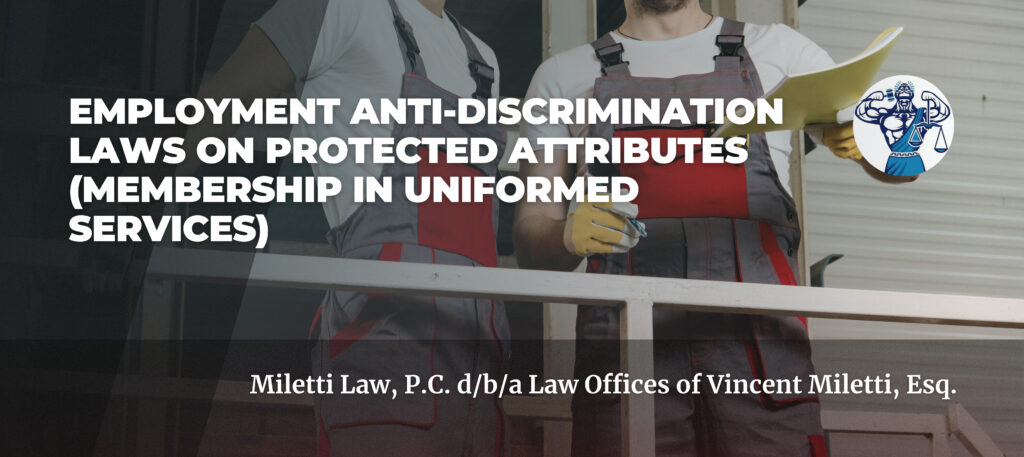Here at the Law Office of Vincent Miletti, Esq. and the home of the #UnusuallyMotivated movement, we take pride as a resilient and dependable legal services firm, providing such services in both a traditional and online, web-based environment. With mastered specialization in areas such as Employment and Labor Law, Intellectual Property (IP) (trademark, copyright, patent), Entertainment Law, and e-Commerce (Supply Chain, Distribution, Fulfillment, Standard Legal & Regulatory), we provide a range of legal services including, but not limited to traditional legal representation (litigation, mediation, arbitration, opinion letters, and advisory), non-litigated business legal representation and legal counsel, and unique, online legal services such as smart forms, mobile training, legal marketing, and development.
Still, here at Miletti Law®, we feel obligated to enlighten, educate, and create awareness, free of charge, about how these issues and many others affect our unusually motivated® readers and/or their businesses. Accordingly, to achieve this goal, we have committed ourselves to creating authoritative, trustworthy, & distinctive content. Usually, this content is featured as videos posted on our YouTube Channel https://www.youtube.com/channel/UCtvUryqkkMAJLwrLu2BBt6w and blogs that are published on our website WWW.MILETTILAW.COM. With that, the ball is in your court and you have an effortless obligation to subscribe to the channel and sign up for the Newsletter on the website, which encompasses the best way to ensure that you stay in the loop and feel the positive impact of the knowledge bombs that we drop here!
As the authoritative force in Employment Law, it only seemed right to introduce one of the many upcoming series in which we introduce a variety of topics that looks to educate and deliver in a manner that only Miletti Law® can. To that end, this blog is Part VII of our ongoing series on “Life Sciences Industry Guide for Labor and Employment,” in which we review the basics and have an overview of what is encompassed as part of the life sciences industry. In Part VI of the series and our blog titled “Hour & Wage Exemption Classification in Life Sciences Industry,” we mentioned that hour and wage issues in the life sciences industry are regulated pursuant to 29 USC §§ 201–219 under the Fair Labor Standards Act (FLSA) and several related wage orders and state statutes. For this reason and perhaps for the purposes of recordkeeping, overtime, and meeting the minimum wage, the proper classification of employees as exempt or non-exempt is the most significant hour and wage challenge within this industry.
As a continuation of our discussion, this blog is titled “How to Properly Classify Exempt Employees in the Life Sciences” and is an overview of how to classify exempt employees in the life sciences industry properly.
How to Properly Classify Exempt Employees in the Life Sciences
The Fair Labor Standards Act (FLSA) provides applicable exemptions that employers must satisfy when classifying employees in the life sciences as exempt. This implies that an employer is required to show that the responsibilities of an employee’s job satisfy, in addition to a minimum salary threshold, the provisions with regard to executive, administrative, or professional exemptions. Accordingly, an employer must make sure that the primary responsibilities of a job meet specific criteria when it comes to executive, administrative, or professional exemptions. The criteria include:
- Executive exemption – the responsibilities of such a job comprise (1) managing an enterprise (subdivision or department), including customarily or regularly directing how one or more employees carry out their duties, (2) authority to recommend and suggest when and how other employees should be promoted, advanced, fired, or hired and (3) authority to fire or hire other employees.
- Administrative exemption – the responsibilities of such a job entail performing non-manual or office work that is directly linked to the general business or management operations of the employer or the clients, which involves the exercise of independent judgment and discretion on significant business matters.
- Professional exemption – the responsibilities of such a job entail the performance of work that needs an employee to be knowledgeable of an advanced type in a field of learning or science customarily acquired by an extended course of intellectual training.
It is crucial to note that it is not the qualifications of the employee, the job description, or the job title but the reference to the employee’s actual responsibilities that must be met by each of these standards of exemption. Accordingly, this goes without saying that it is the sole responsibility of the employer to prove and demonstrate that based on the executive, administrative, or professional nature of their jobs’ essential tasks, employees are exempt. In line with the FLSA’s provisions, while the types of positions once viewed as exempt are insufficiently circumscribed by regulations, the case law toward classifying more positions as non-exempt is a clear trend.
It is also important to note that where different levels of seemingly exempt, “professional” employees, such as sales and marketing personnel, chemists, analysts, and researchers are employed, it is a challenge to avoid misclassification of employees in the life sciences industry. Accordingly, such employees may, in fact, be non-exempt depending on factors such as the attainment of various recognized forms of “advanced expertise and knowledge” or higher-level degrees. However, irrespective of such factors, misclassification claims could always arise when employers in the life sciences industry assume that the employees are exempt.
In Part VIII of this series and our blog titled “Damages Available to Plaintiffs in FLSA Misclassification Claims,” we shall move the discussion forward by hammering on the damages entitled to FLSA plaintiffs who prevail in misclassification claims in the life sciences industry.
In the meantime, stay tuned for more legal guidance, training, and education. In the interim, if there are any questions or comments, please let us know at the Contact Us page!
Always rising above the bar,
Isaac T.,
Legal Writer & Author.
 Professional Legal & Business Services And Representation - English & Espanol!
Professional Legal & Business Services And Representation - English & Espanol!

 314-648-2586
314-648-2586 CALL US NOW
CALL US NOW







